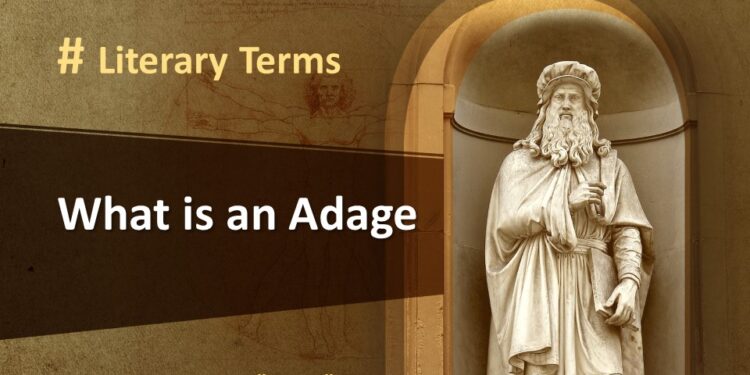What is an Adage?
An adage is a concise, memorable saying that expresses a general truth or piece of wisdom. It is often passed down through generations and becomes deeply embedded in a culture’s collective consciousness. Adages are powerful linguistic tools that condense complex ideas into easily digestible statements. They offer guidance, provoke thought, and reflect the values and experiences of a community. In this article, we will delve into the world of adages, exploring their origins, meanings, and cultural significance.
Origin and Meaning
Adages have a rich history that dates back centuries. These timeless expressions have been used by various civilizations to encapsulate their beliefs, experiences, and lessons learned. The exact origins of adages are difficult to trace, as they have been transmitted orally for generations before being recorded in written form. They are often deeply intertwined with a culture’s folklore, literature, and oral traditions.
Adages derive their power from their brevity and universal applicability. They convey profound wisdom in just a few words, allowing them to be easily remembered and shared. These sayings often employ vivid imagery, metaphors, or analogies to enhance their impact and make them more memorable.
Examples of Adages
Throughout history, numerous adages have become deeply ingrained in our everyday language and cultural lexicon. Let’s explore some popular adages and their meanings:
- “Actions speak louder than words” – This adage emphasizes that people’s actions reveal their true character more accurately than their words or promises.
- “Don’t count your chickens before they hatch” – This adage advises against premature optimism and cautions against making assumptions about future outcomes.
- “Where there’s smoke, there’s fire” – This adage suggests that if there are signs or rumors of a certain situation or problem, there is likely some truth to it
- “Haste makes waste” – This adage warns against rushing or acting impulsively, as it often leads to mistakes or inefficiency.
- “A penny saved is a penny earned” – This adage promotes the value of frugality and emphasizes the importance of saving money.
Usage and Application
Adages find widespread use in everyday language and serve various purposes. They offer practical advice, moral guidance, and serve as cautionary tales. Adages can be employed to convey complex concepts concisely, making them suitable for speeches, presentations, and writing. They often resonate with people due to their relatability and timelessness.
In literature, movies, and media, adages are frequently utilized to add depth to characters, evoke emotions, or convey underlying messages. Writers and filmmakers draw on the wisdom encapsulated in adages to enhance storytelling and engage the audience on a deeper level. Adages are also commonly used as titles for books, chapters, or articles, enticing readers with their concise and thought-provoking nature.
Adages in Different Cultures
Adages are not limited to a single culture or language; they are found worldwide. Each culture contributes its unique collection of adages, reflecting its values, beliefs, and experiences. For example, in English, we have “A stitch in time saves nine,” while in Japanese, they say “Fall seven times, stand up eight.” Exploring adages from different cultures provides a fascinating glimpse into the diverse ways in which humanity expresses shared wisdom.
Furthermore, adages can vary within a single language, with regional differences adding nuance and cultural context. For instance, in the United States, the adage “The early bird catches the worm” might be replaced with “The early bird gets the worm” in certain regions. These variations highlight the intricate tapestry of adages and the cultural diversity from which they originate.
Interpretation and Relevance
The interpretation of adages can vary depending on personal experiences and cultural background. They can be analyzed from different perspectives, revealing layers of meaning and providing insights into a society’s values and norms. Adages often address universal themes such as love, friendship, perseverance, and the human condition, allowing individuals to relate to them on a personal level.
Despite their ancient origins, adages remain relevant in today’s society. They continue to inspire, provoke thought, and guide individuals in navigating life’s complexities. Adages serve as reminders of timeless principles and offer moral and ethical compasses in a rapidly changing world.
Proverbs vs. Adages
Adages and Proverbs: Definition and Examples While adages and proverbs share similarities, they are not interchangeable. Proverbs are broader in scope and often offer prescriptive advice or cultural norms. Adages, on the other hand, tend to be more specific and focused on expressing general truths. While both are valuable linguistic tools, adages excel in their ability to distill wisdom into concise, memorable statements.
Adages in Popular Culture
Adages have seeped into popular culture, finding their way into songs, movies, advertisements, and everyday conversations. In popular songs, lyrics often incorporate adages to convey deeper meanings or reinforce the message of the song. Similarly, movies and advertisements use adages to create emotional connections, evoke nostalgia, or tap into shared cultural references.
Adages also play a significant role in shaping public discourse. Politicians, leaders, and influencers often utilize these sayings to make their messages more persuasive, relatable, and memorable. Adages possess the power to distill complex ideas into succinct phrases that resonate with a wide audience.
Example 1
- Boy Scouts: Be prepared.
- US Army: Be all that you can be.
- Women’s Social and Political Union: Deeds not words.
Preservation and Evolution
Preserving adages is crucial for safeguarding cultural heritage and passing down accumulated wisdom to future generations. While the core meanings of adages remain intact, their usage and interpretation can evolve over
time. Adages adapt to new contexts, incorporating modern references and technological advancements without losing their fundamental wisdom.
As societies change and evolve, adages continue to be shaped by new experiences, societal shifts, and the emergence of global influences. Their ability to adapt ensures their ongoing relevance and allows them to serve as bridges between different generations.
Conclusion
Adages are linguistic gems that encapsulate wisdom and offer timeless guidance. They are the distilled knowledge of countless generations, reflecting the collective experiences and values of diverse cultures. Adages find their way into everyday conversations, literature, and popular culture, enriching our language and connecting us with our shared humanity. By embracing and exploring adages, we gain access to profound insights and a deeper understanding of the world around us.
FAQs
Q: What is the difference between an adage and a proverb?
A: While adages and proverbs are similar, adages are more specific and focused on expressing general truths, while proverbs are broader in scope and often offer cultural or prescriptive advice.
Q: Can adages be specific to certain regions or countries?
A: Yes, adages can vary within a single language and be specific to certain regions or countries, reflecting the cultural context and experiences of those regions.
Q: How are adages created?
A: Adages are often created through the observation of recurring patterns, experiences, and shared wisdom. They are distilled into concise, memorable statements that convey general truths.
Q: Are adages still relevant in today’s society?
A: Absolutely. Adages continue to resonate with people today, as they address universal themes and offer timeless wisdom that can guide individuals in navigating life’s challenges.
















